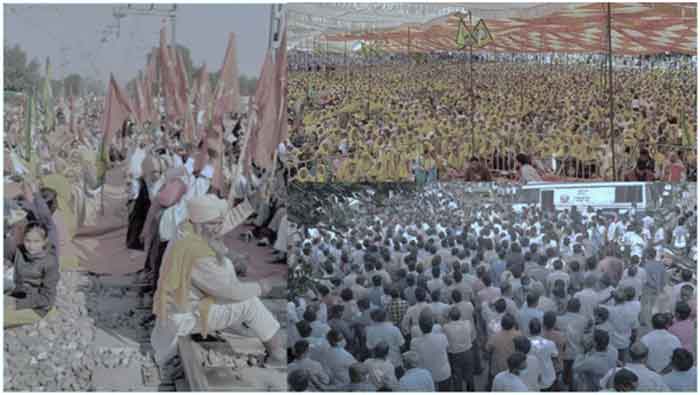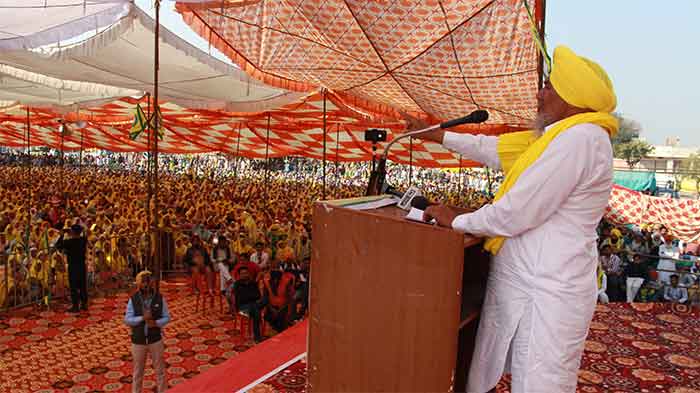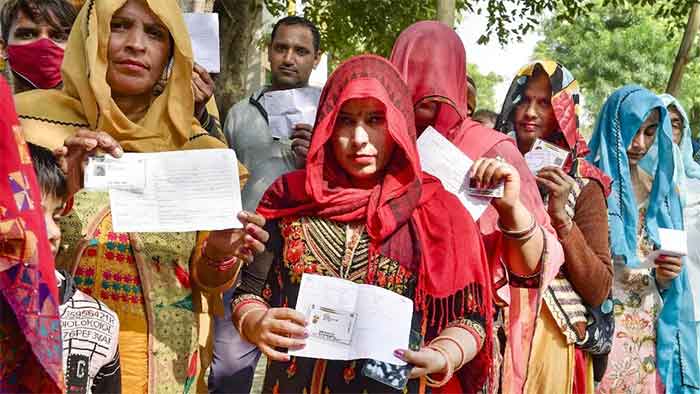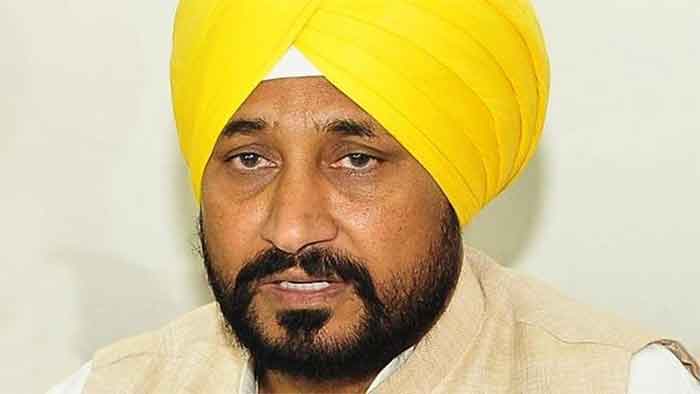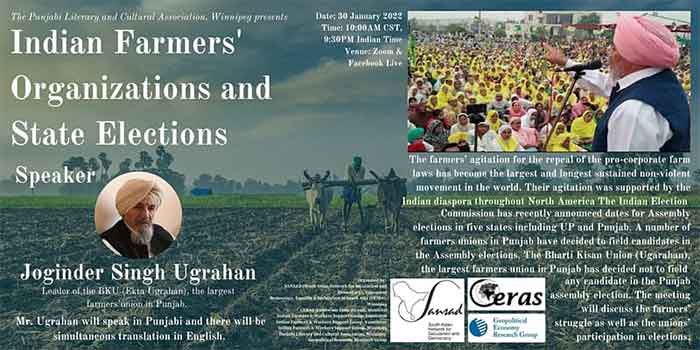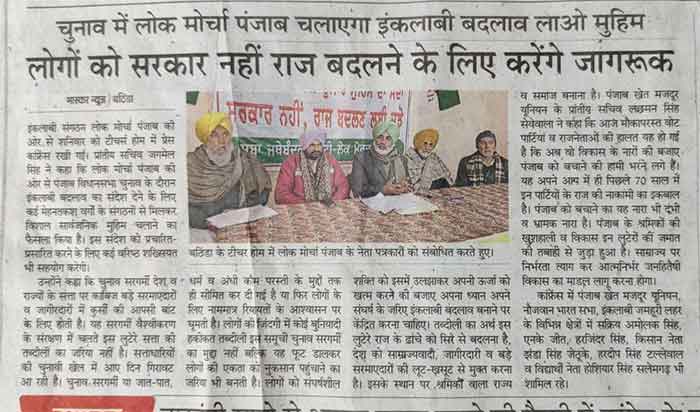
Lok Morcha Punjab adressed a meeting in Teachers Home Bathinda, on January 22nd which was curtailed in terms of size because of covid restrictions. Still it was one of the most qualitative in projecting the democratic revolutionary alternative model to the people. It stressed on active political campaign, opposing slogan of boycott and participating in elections. Speakers touched upon the very thick of the skin of the repressive social order and how to galvanise people to their full potential in waging a struggle against it.
The organisation has planned a sustained one month campaign in many districts of Punjab and the agenda of the leaflet is being seriously studied by cadre of the revolutionary mass organisations.
For 25 years since it conducted the Roshni Mela rally in February Lok Morcha has sparkled the flame of revolutionary message of Shaheed Bhagat Singh in successive election campaigns and been an architect in ingraining revolutionary political consciousness during elections. Most impactful campaigns were conducted in 1998; in 1999 and 2012 projecting genuine democratic alternative .Lok Morcha paved the path for the people in building or sharpening their class mass organisations and bridging the gap between landed peasantry and agricultural labour. Nowhere in India was genuine revolutionary democracy projected at such a scale openly. This year let us hope history repeats itself .It should play a major role in bridging the gap between the landed jat peasantry and dalit agricultural labour and link the workers struggles and other toiling sections like unemployed teachers and govt.employees, with that of the peasantry.
It highlighted how the current social order was an instrument of the ruling and exploiter classes and could not solve the genuine grievances or day to day issues of the people. The anti democratic manner the parliamentary system functioned which won votes by making false promises ,was The people were reminded how land still remained in the possession of big or absentee landlords, with land reforms only superficial. It explained how the oppressed masses were still suffering under the yoke of imperialism with farmers incurring huge debts and the nation dancing to the tune of imperialist powers by patronising multinationals. The pro-rich economic policies were condemned tracing the origin from 1947 itself and how foreign capital till this day held its sway to trap genuine progress. It gave priority to people consolidating or building their own democratic organisations to accentuate struggle and creating common platforms for different sections to come together. Issues were touched upon like inflation, unemployment, farmer’s suicides. Prices to procure aata, inadequate housing staggering electricity bills, land seizures police repression on protests, genuine democrats incarcerated etc.The importance of an issue or demand of a particular section being linked to the broad masses on the whole was adressed be it on electricity, price of aata, wages or debt etc.
Lok Morcha Punjab vouched for a social order created which removed the bondage of foreign capital by confiscating it, abolishing casteist discrimination, money lending system or usury and slavery of women, implementing land reforms through proper agrarian revolution, workers owning the means of production, creating village scale aggro-industries which would create employment, a secular and scientific education system, employment and literacy for all and a free health sytem. and a genuine pro-people culture promoted to replace the current one. In a general sense it projected a social system similar to what China did at stage of New Democratic Revolution.
The Punjab Khet Mazdoor Union and the Naujwan Bharat Sabha formally supported the Lok Morcha and a team of democratic intellectuals.The BKU(Ekta-Ugrahan) was unable to be part of this platform as it’s agenda as its agenda differed from it ,in terms of agrarian revolutionary programme.
Lok Morcha Punjab secretary Jagmel Singh narrated how a radical change had to be undertaken of the autocratic socio-political system and not by voting for any political party. He stressed that in essence all the parties represented the exploiter classes. All the aspects of a genuinely democratic system and how the workers should control the means of production and set up their own state was adressed by Jagmel Singh.The manner the rulers used the weapon of communalism to play games and divide the people to divert them from their burning issues was highlighted. He explained how the current policies patronised landlordism and imperialism at the very loot.
Punjab Khet Mazdoor Union secretary Lacchman Singh Sewewala spoke about how for 70 years no fundamental transformation took place and there was deterioration in the social order. He narrated how every ruling class party was a master in hoodwinking the masses to win votes and how the people were unfortunately swayed by one party or another.Sewevala called on the people to wage an intense struggle against imperialism and feudalism.
Intellectuals like Lok Morcha advisor and advocate Narinder Kumar Jeet,Punjab Loksabyachark Manch leader Amolka Singh,Punjab Students union(Shaheed Randahawa) leader Hushiyar Salemgarah ,BKU(Ugrahan) leader Jhanda Singh Jethuke also adressed the meeting. All firmly condemned the repressive social order and the need for people to build a genuine alternative. They delved into important history of the past and capacity of people to challenge the autocratic rule. All gave emphasis on the threat of Hindutva fascism of the Bharatiya Janata Party but none supported the Aam Admi party.
In no other part of India is there such a platform like Lok Morcha, which projects the cutting edge of revolutionary democracy or Marxism-Leninism at ground level.A state like Uttar Pradesh particularly is lacking such an organization, where Hindutva fascism is blazing at a crescendo. Historically Lok Morcha Punjab played an important role in sharpening the cutting edge of class struggle and the burning issues of the opressed masses. In contrast Maoist trend persisted with call of Boycott which is sectarian while other sections tailed behind ruling classes by putting up candidates. I regret there was no participation from forces like Inquilabi Kendra BKU)Dakaunda) or Kirti Kisan Union in Punjab or other mass organisations supporting trend of C.P.I. (M.L.) New Democracy.
Harsh Thakor is a freelance journalist.Toured India,particularly Punjab .Written on Mass movements ,,Massline,Maoism on blogs like Democracy and Class Struggle and frontierweekly

